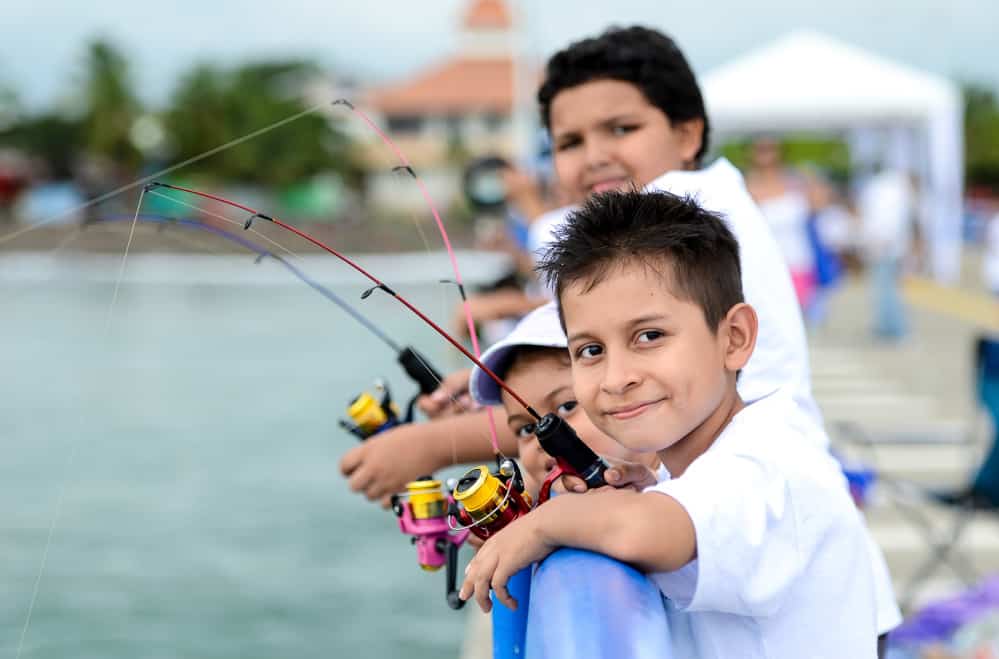Due to an increase in recreational fishing in the coastal zones of the country, and because this is an activity that generates communal and family bonds, an important change was made by discussing the legal aspects of the participation of children and teenagers in this activity. Until recently, Article 69 of Costa Rica’s Fishing and Aquaculture Law regulations prohibited recreational fishing to children under the age of 16.
Recreational or sport fishing is an activity that unites the family, promotes the development of skills and abilities important for life, enables closer contact with nature and the comprehension of its basic processes, promotes the knowledge of aquatic biology and enables children to see different sea species, to mention a few of its benefits.
Education is one of the most important processes in childhood, and it must go beyond formal learning, thus it becomes necessary to promote recreational activities with educational content.
The former fishing regulations, which were modified on Feb. 10 of this year, established that sport fishing would only be allowed for people over the age of 16, which meant that children and teenagers under that age could not ask for a permit required for such activity. The disposition meant an absolute prohibition for children because according to Costa Rican law, the permit is a requirement for someone who wants to participate in recreational fishing.
Children under 16 were also not able to participate in fishing tournaments held in the country (although in practice, some tournaments for children were still held). Such exclusion was discriminatory and contrary to the legal principle of superior interest of the child, impeding the integral development of youth.
Costa Rican law has been gradually changing to promote the active participation of minors in social life, following the principle of superior interest of the child. Due to this, an executive decree was passed on Jan. 25 changing the fishing regulations to allow for children to fish for fun.
The Declaration of the Rights of the Child establishes a series of principles that are fundamental for the protection of their rights. For example, principle seven says that education is not limited to a system of formal and institutional learning: “The child shall have full opportunity for play and recreation, which should be directed to the same purposes as education; society and the public authorities shall endeavor to promote the enjoyment of this right.”
Costa Rica’s Constitution protects the right of children to have access to recreation in equal conditions under the law, according to article 33, and this same right is stated in the Convention of the Rights of the Child. These fundamental rights and principles are also stated in article 56 of the Code on Childhood and Adolescence, which says that children have the right to receive an adequate education oriented to the development of their full potential.
Also, it must be pointed out that the age discrimination inherent in article 69 of the fishing regulation was absolutely unjustified, because recreational fishing is not a dangerous or inappropriate activity for children. Additionally, it is not an activity which the State should discourage for environmental reasons: the impact of recreational and sport fishing on the environment is practically nonexistent.
The reform of article 69 of the fishing regulation is intended as a means to reach the objectives of the National Plan for Sustainable Tourism Development 2010-2016 created by the Costa Rican Tourism Institute. With the reform, it will be possible to reduce the seasonal nature of tourism by promoting fishing tournaments in the low season, which will now be able to include children and teenagers. This will stimulate family education in the adequate practices for sustainable fishing, as well.
The prohibition of leisure fishing for minors under the age of 16 was not only contrary to the superior interest of children and their fundamental rights, but also limited both their education and recreation. Such a restriction ruined the possibility for children to participate in an activity that is great for their integral education and skill development.
Definitely, the reform must be applauded since it benefits children, recreational and sport fishing and the country as a whole.
Germán Ignacio Pochet Ballester is an environmental law specialist at BIOIURIS. He can be reached at gpochet@legalambiental.com.






